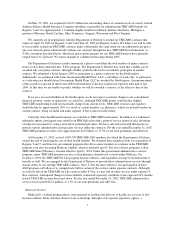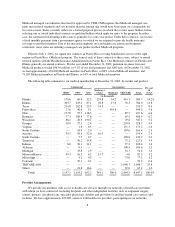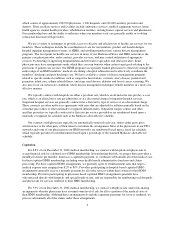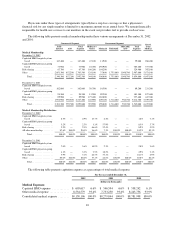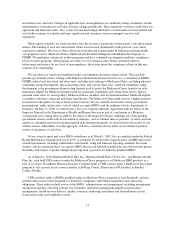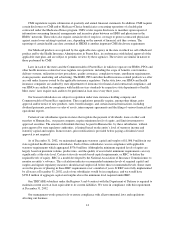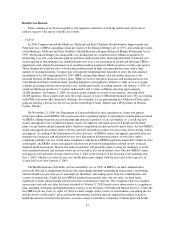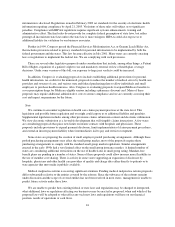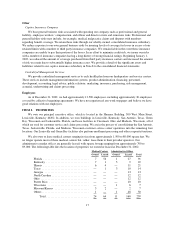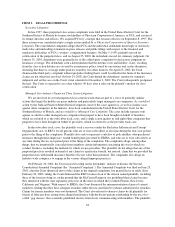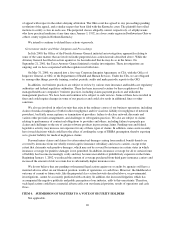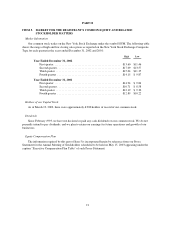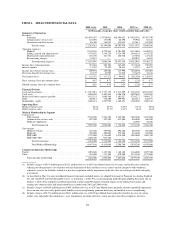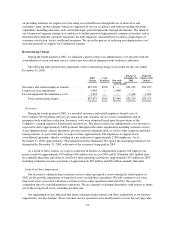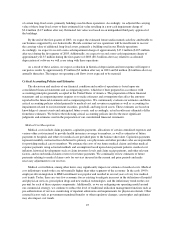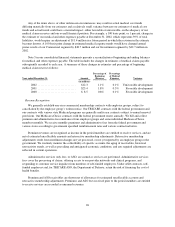Humana 2002 Annual Report Download - page 22
Download and view the complete annual report
Please find page 22 of the 2002 Humana annual report below. You can navigate through the pages in the report by either clicking on the pages listed below, or by using the keyword search tool below to find specific information within the annual report.information is disclosed. Regulations issued in February 2003 set standards for the security of electronic health
information requiring compliance by April 21, 2005. Violations of these rules will subject us to significant
penalties. Compliance with HIPAA regulations requires significant systems enhancements, training and
administrative effort. The final rules do not provide for complete federal preemption of state laws, but rather
preempt all inconsistent state laws unless the state law is more stringent. HIPAA could also expose us to
additional liability for violations by our business associates.
Further in 1999, Congress passed the Financial Services Modernization Act, or Gramm Leach Bliley Act,
that includes provisions related to privacy standards for personal information to be implemented by both the
federal government and the states. This law became effective in July 2001. Many states are currently enacting
laws or regulations to implement the federal law. We are complying with such provisions.
There are several other legislative proposals under consideration that include, among other things, a Patient
Bill of Rights, expansion of a patient’s right to sue and mandatory external review of health plan coverage
decisions. Under some versions of this bill, our exposure to large jury verdicts could be increased.
In addition, Congress is evaluating proposals to include establishing additional protections for personal
health information, tax credits for the uninsured, proposals to reduce the number of medical errors by health care
providers and systems of care, and various state and federal purchasing plans to allow individuals and small
employers to purchase health insurance. Also, Congress is evaluating proposals to expand Medicare benefits to
cover prescription drugs for Medicare-eligible seniors including a pharmacy discount card. Many of these
proposals may require additional administrative costs to ensure compliance and we are currently assessing their
cost and impact on premiums for the future.
State
We continue to encounter regulation on health care claims payment practices at the state level. This
legislation and possible future regulation and oversight could expose us to additional liability and penalties.
Supplemental legislation includes among other provisions claims submission content and electronic submission.
We view electronic submission as a favorable development that will simplify claims interactions. A few states
are considering proposals that place new limits on insurer contacts with hospitals and physicians. These
proposals include provisions to expand payment disclosure, limit implementation of claims payment procedures,
and extend an insurer payment liability where intermediaries fail to pay and restrict recoupment.
Some states are proposing the creation of small employer pooled purchasing arrangements. Although these
pooled purchasing arrangements may affect the small group market, most of the proposals require these
purchasing arrangements to comply with the standard small group market regulations. Similar arrangements
enacted in the early 1990s had a very limited affect on the small group insurance market. A limited number of
states are considering additional restrictions on the use of health status in small group rating. Mandate-free
benefit plans are pending in a number of states. Some of these proposals could allow insurers more flexibility in
the use of member cost sharing. There is activity in some states supporting an expansion of disclosure by
hospitals, physicians and other health care providers of quality and charge data either directly to patients or to
state agencies that must make it publicly available.
Medical malpractice reform is receiving significant attention. Pending medical malpractice reform proposals
differ substantially relative to the entities covered by the reforms. Since the substance of the reforms remains
under discussion and the scope of covered entities has not been resolved in most states, management is unable to
predict future activity under these laws.
We are unable to predict how existing federal or state laws and regulations may be changed or interpreted,
what additional laws or regulations affecting our businesses may be enacted or proposed, when and which of the
proposed laws will be adopted or what effect any such new laws and regulations will have on our financial
position, results of operations or cash flows.
16



